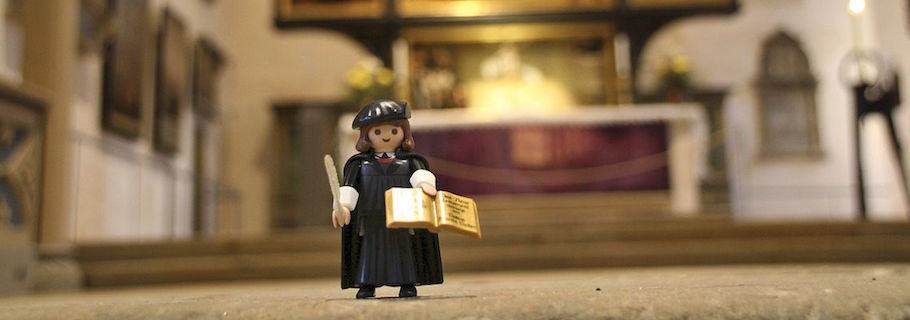Is the Reformation over? Have the issues that divided Protestants and Catholics been sufficiently resolved that we can now pursue a return to unity? At the very end of his book Rescuing the Gospel, an account of the Protestant Reformation, Erwin Lutzer offers a compelling answer. While he admits that both Protestantism and Catholicism have developed since the sixteenth century and while he points out areas in which Protestants and Catholics are working in a common cause toward common goals, he insists that the Reformation has not yet come to an end. Any unity would come at the expense of the gospel. “On the most critical issue, namely the salvation of the human soul, Luther’s Reformation is far from over … No matter how many changes the Catholic Church makes, it will not—indeed cannot—endorse an evangelical view of salvation.”
Many make the argument that Catholicism has changed, that the church of the twenty-first century is so vastly different from the church of the sixteenth century that the old disagreements and arguments no longer hold. But here Lutzer points to 5 contemporary teachings of the Roman Catholic Church that must continue to divide us.
Mary. “The church still holds to the traditions it has always held about Mary, her perpetual virginity, her immaculate conception (which denies the biblical truth that all have sinned), the assumption of her body and soul into heaven, the queenship of heaven, and—most seriously of all—the ‘infallible’ teaching that she is the mediatrix of all grace, thus sharing with the Lord Jesus Christ in providing salvation for mankind. The catechism says, ‘By her intercession she continues to bring us the gifts of eternal salvation … Therefore the Blessed Virgin is invoked in the Church under the titles of Advocate, Helper, Benefactress, and Mediatrix.” It is to her “protection that the faithful fly in all their dangers and needs.”
Transubstantiation. The updated 1994 Catechism of the Catholic Church continues to teach transubstantiation, the doctrine that “the sacrifice of Christ and the sacrifice of the Eucharist are one single sacrifice … the same Christ who offered himself once in a bloody manner on the altar of the cross is contained and offered in an unbloody manner.” “Catholics are taught to worship the consecrated wafer … indeed, parishioners are instructed to give these consecrated elements the highest form of worship—the same degree reserved for the Holy Trinity. Historically (and to this present day) the Catholic Church has taught that salvation comes only through the grace given in the sacraments which, they say, unite the participant to Christ.”
It comes as a surprise to many Protestants that the Catholic Church continues to affirm the use of indulgences.
Indulgences. It comes as a surprise to many Protestants that the Catholic Church continues to affirm the use of indulgences. But “when Pope Francis visited Brazil for World Youth Day in 2013, the Vatican offered a plenary (complete) indulgence to those who couldn’t attend the event but followed on Twitter or by other means. The difference between today and days gone by is that indulgences are no longer sold as such; they are obtained by following the prescribed rituals and showing proper devotion to God as requested by the pope.” The very issue that sparked the Reformation remains in effect today.
Superstitions. While Lutzer admits that there is variance between official and unofficial teaching when it comes to superstitions, he also shows that the Church makes no move to ban such superstitions. To the contrary, they are tolerated and celebrated. “In St. Peter’s Basilica, long lines of people stand before a statute of the apostle to touch (or kiss) his toe. I asked our tour guide about this, and she said, ‘We have this tradition that if you touch Peter’s toe and die you go directly to heaven and bypass purgatory’.” Sure, this is unofficial teaching, “but why would Rome—in the very Vatican no less—foster and encourage these kinds of superstitions that mislead millions? Why aren’t the priests, in Rome or the West, condemning these kinds of abuses? What difference does an accord on justification with Protestants make as long as crowds continue to line up in the Vatican to touch the toe of Peter in order to receive special blessings, perhaps even the promise of eternal life?”
Sainthood. While both Protestants and Catholics speak of saints, we use the word very differently. The Catholic view of sainthood in which saints are recognized and canonized by the church, proves that Catholicism teaches a completely different understanding of justification and of glorification. In this way any doctrine of sainthood does not stand on its own but points to much deeper and more serious issues.
Again Lutzer asks the question: Is the Reformation over? Yes, “the complexity of the Reformation of the sixteenth century with all of its conflicts that permanently changed the map of Europe—that Reformation is over. But the doctrines that Luther and Calvin stood against—that aspect of the Reformation is not over.” In light of that, Lutzer insists that evangelicals remain vigilant like Luther, for “in some sense, our task is more difficult than his.” In the same way Paul rebuked Peter in Galatians 2:11 for giving the “impression that he agreed with the Judaizers,” we too must diligently rescue the gospel from even appearing off course. In short, conceding to blurred lines for the sake of unity is spiritual compromise. “We must remind the world that the gospel of the New Testament is for the spiritually needy who have nothing to offer God; they come not to give but to receive; they come not just to be helped but to be rescued.Their contribution to salvation is their sin; God’s grace supplies everything else.”










